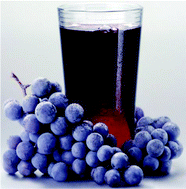
In this work, Alan Crozier and colleagues from Glasgow, UK, have investigated the aromatic compounds that result from colonic catabolism of Concord grape juice using an in vitro model of colonic fermentation. After consuming the grape juice substantial quantities of (poly)phenolic compounds reach the large intestine, where they are degraded to bioactive phenolic acids and aromatic compounds, which pass through the circulatory system before being excreted in the urine. The in vivo fate of these catabolites following absorption in the colon was also investigated by GC-MS. It was found that 40% of ingested (poly)phenolic compounds in Concord grape juice pass from the small to the large intestine and contributes to the increased bioavailabilty of the Concord grape polyphenolics.
To read the full article for free until the 1st November, please click the link below:
Colonic catabolism of dietary phenolic and polyphenolic compounds from Concord grape juice, Angelique Stalmach, Christine A. Edwards, Jo Lynne D. Wightman and Alan Crozier, Food Funct., 2012, DOI: 10.1039/c2fo30151b
You can keep up to date with the latest developments from Food & Function by signing up for free table of contents alerts and monthly e-newsletters.










